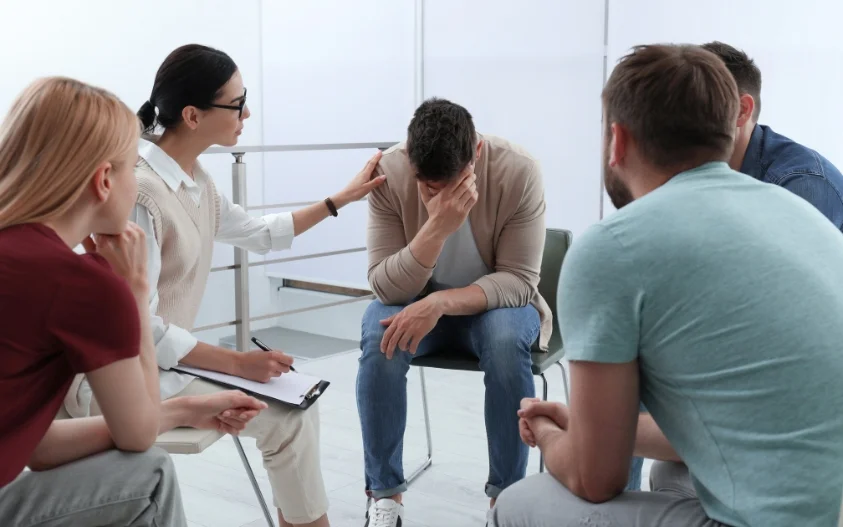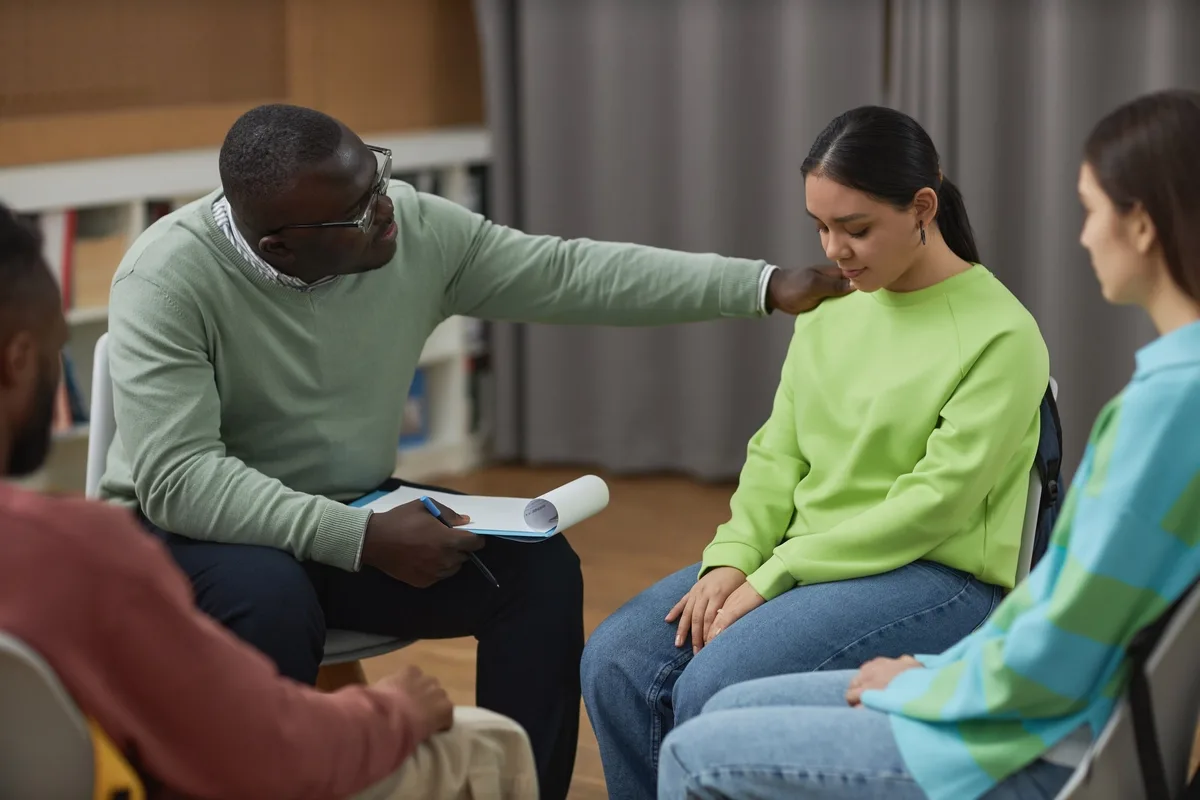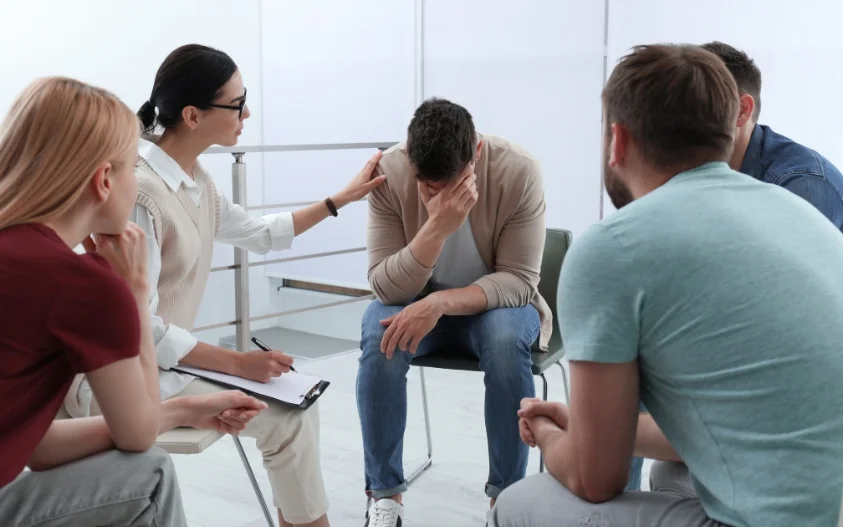24/7 Helpline:
(866) 899-221924/7 Helpline:
(866) 899-2219
Learn more about PTSD Treatment centers in Saint Johns County
PTSD Treatment in Other Counties

Other Insurance Options

Premera

Health Net
Beacon

GEHA

Coventry Health Care

MVP Healthcare

State Farm

Cigna

Group Health Incorporated

Optima

Ceridian

Sutter

PHCS Network

WellCare Health Plans

Anthem

United Health Care

Multiplan

Magellan Health

Kaiser Permanente

ComPsych

Intensive Treatment Modalities Group
Intensive Treatment Modalities Group hast provided mental health treatment and care for adult and ad...

EPIC Recovery Center
Epic Recovery Center is a premier drug and alcohol addiction treatment facility in Saint Augustine, ...

EPIC Behavioral Healthcare
EPIC Behavioral Healthcare offers outpatient treatment for individuals with alcohol and/or substance...

Recovery Keys
Recovery Keys offers outpatient treatment for individuals dealing with substance addiction and/or co...

New Season – St. Augustine Metro Treatment Center
New Season - St. Augustine Metro Treatment Center is a private rehab located in Saint Augustine, FL....

The Augustine Recovery Center
The Augustine Recovery Center is a residential substance abuse treatment center for men. The Augusti...

Pearl of the Sea Retreat
Pearl of the Sea Retreat is an inpatient rehab facility located in sunny Saint Augustine, FL. Pearl ...

Upper Bay Counseling and Support Services
Upper Bay Counseling and Support Services is a private rehab located in Elkton, Maryland. Upper Bay ...

Upper Bay Counseling and Support Services – Community Services
Upper Bay Counseling and Support Services – Community Services is a private rehab located in Elkton,...

Project Chesapeake
Project Chesapeake is a private addiction, substance abuse, and mental health counseling organizatio...

Haven House
Situated in Elkton, Maryland, Haven House is a drug and alcohol treatment center for men with substa...

Open Door
Open Door is a private rehab located in Elkton, Maryland. Open Door specializes in the treatment of ...

Pine Rest Christian Mental Health Services
Pine Rest Christian Mental Health Services - Meadow Run is located in Hastings Michigan. Pine Rest C...

Barry County Community Mental Health
Barry County Community Mental Health Authority, commonly referred to as BCCMHA, provides mental heal...

Faith Family Recovery Center
Faith Family Recovery Center is a faith-based and family-oriented treatment program committed to pro...

Cochran Recovery Services
Cochran Recovery Services is a non-profit and cost-effective organization that provides comprehensiv...

Mary Lanning Healthcare – Behavioral Services
Mary Lanning Healthcare – Behavioral Services is a private rehab located in Hastings, Nebraska. Mary...

The Bridge – South Kansas Street
The Bridge provides a holistic substance abuse recovery program for women and their families in a sa...

South Central Behavioral Services – Assertive Community Treatment
South Central Behavioral Services -Assertive Community Treatment is a Community Behavioral Health ag...

Revive Ministries – Horizon Recovery and Counseling
Revive Ministries - Horizon Recovery and Counseling is a private, counseling clinic located in Hasti...

South Central Behavioral Services – Opportunity House
South Central Behavioral Services - Opportunity House offers behavioral healthcare and mental health...

South Central Behavioral Services – Outpatient
South Central Behavioral Services (SCBS) is a Community Behavioral Health agency providing mental he...


















































SMA Outpatient St. Augustine
SMA Outpatient St. Augustine is a non-profit rehab located in Saint Augustine, Florida. SMA Outpatie...

AA – Alcoholics Anonymous
AA – Alcoholics Anonymous is a non-profit rehab located in Saint Augustine, Florida. AA – Alcoholics...

Addiction and Intervention Professionals
Addiction and Intervention Professionals is a private rehab located in Saint Augustine, Florida. Add...

Alcohol Detox Drug Rehab
Alcohol Detox Drug Rehab is a private rehab located in Saint Augustine, Florida. Alcohol Detox Drug ...

St. Johns County Outpatient Center
St. Johns County Outpatient Center offers outpatient treatment for individuals with alcohol and/or s...

Barry County Mental Health Authority
Barry County Mental Health Authority is a public rehab located in Hastings, Michigan. Barry County M...

AA – Alcoholics Anonymous
AA – Alcoholics Anonymous is a non-profit rehab located in Hastings, Nebraska. AA – Alcoholics Anony...

Hastings Area Council on Alcohol
Hastings Area Council on Alcohol is a private rehab located in Hastings, Nebraska. Hastings Area Cou...

South Central Behavioral Services – Able House
South Central Behavioral Services – Able House is a private rehab located in Hastings, Nebraska. Sou...

The Bridge
The Bridge is a non-profit rehab located in Hastings, Nebraska. The Bridge specializes in the treatm...































































